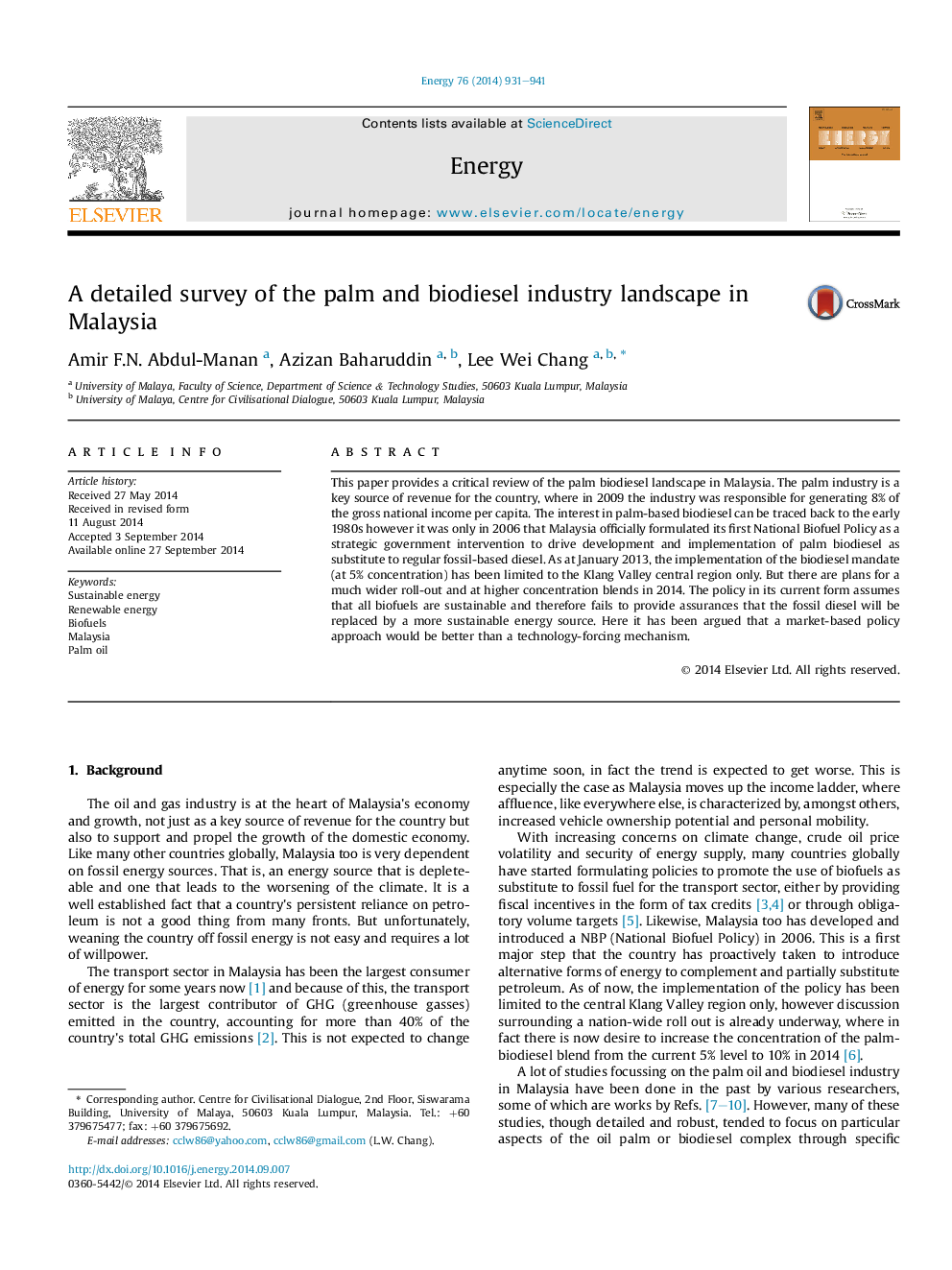| کد مقاله | کد نشریه | سال انتشار | مقاله انگلیسی | نسخه تمام متن |
|---|---|---|---|---|
| 8076937 | 1521470 | 2014 | 11 صفحه PDF | دانلود رایگان |
عنوان انگلیسی مقاله ISI
A detailed survey of the palm and biodiesel industry landscape in Malaysia
ترجمه فارسی عنوان
بررسی دقیق چشم انداز صنعت نخبه و بیودیزل در مالزی
دانلود مقاله + سفارش ترجمه
دانلود مقاله ISI انگلیسی
رایگان برای ایرانیان
کلمات کلیدی
انرژی پایدار، انرژی تجدید پذیر، سوخت های زیستی، مالزی، روغن نخل،
ترجمه چکیده
این مقاله نقد و بررسی چشم انداز چشم انداز بیودیزل نخل در مالزی را فراهم می کند. صنعت نخل یک منبع کلیدی درآمد برای کشور است که در سال 2009 این صنعت مسئول تولید 8 درصد درآمد ناخالص ملی در سرانه بود. علاقه به بیودیزل بر پایه نخل را می توان در اوایل دهه 1980 مشاهده کرد، با این حال تنها در سال 2006، مالزی رسما اولین سیاست ملی سوخت زیستی خود را به عنوان دخالت دولت استراتژیک برای توسعه و اجرای بیودیزل نخل به عنوان جایگزین به طور منظم مبتنی بر فسیل دیزل همانطور که در ژانویه 2013، اجرای دستورالعمل بیودیزل (با غلظت 5 درصد) تنها به منطقه مرکزی دره کلانگ محدود شده است. اما در سال 2014 برنامه هایی برای گسترش بسیار گسترده تر و ترکیبات غلظت بالایی وجود دارد. سیاست در شکل فعلی آن فرض می کند که تمام سوخت های زیستی پایدار هستند و بنابراین نمی توانند اطمینان حاصل کنند که دیزل فسیلی جایگزین یک منبع انرژی پایدار . در اینجا استدلال شده است که یک رویکرد سیاستی مبتنی بر بازار بهتر از مکانیسم تحریک فن آوری است.
موضوعات مرتبط
مهندسی و علوم پایه
مهندسی انرژی
انرژی (عمومی)
چکیده انگلیسی
This paper provides a critical review of the palm biodiesel landscape in Malaysia. The palm industry is a key source of revenue for the country, where in 2009 the industry was responsible for generating 8% of the gross national income per capita. The interest in palm-based biodiesel can be traced back to the early 1980s however it was only in 2006 that Malaysia officially formulated its first National Biofuel Policy as a strategic government intervention to drive development and implementation of palm biodiesel as substitute to regular fossil-based diesel. As at January 2013, the implementation of the biodiesel mandate (at 5% concentration) has been limited to the Klang Valley central region only. But there are plans for a much wider roll-out and at higher concentration blends in 2014. The policy in its current form assumes that all biofuels are sustainable and therefore fails to provide assurances that the fossil diesel will be replaced by a more sustainable energy source. Here it has been argued that a market-based policy approach would be better than a technology-forcing mechanism.
ناشر
Database: Elsevier - ScienceDirect (ساینس دایرکت)
Journal: Energy - Volume 76, 1 November 2014, Pages 931-941
Journal: Energy - Volume 76, 1 November 2014, Pages 931-941
نویسندگان
Amir F.N. Abdul-Manan, Azizan Baharuddin, Lee Wei Chang,
